
What Are the Implications of the Anticipated British Recognition of a Palestinian State?
SadaNews - The United Kingdom is expected to announce its official recognition of a Palestinian state in the coming days, following a shift in its stance on this issue in July.
In this context, Patrick Wintour, the diplomatic editor of The Guardian, wrote an article titled "What Does the UK's Recognition of a Palestinian State Mean?" stating that "this British shift came directly after French President Emmanuel Macron announced that France would take a similar step and issue an official announcement regarding recognition of the Palestinian state during the upcoming United Nations General Assembly meeting in New York next Monday."
This step carries "deep political and humanitarian implications" and comes as the United Kingdom seeks to support a two-state solution and end the Israeli-Palestinian conflict, according to the author.
This announcement also comes at a time when the Middle East is witnessing unprecedented escalation, reflecting a shift in the British stance that has long been characterized by caution regarding unilateral recognition of a Palestinian state.
The British government asserts that this step does not aim to undermine negotiations but rather to enhance opportunities for peace by providing Palestinians with broader international legitimacy.
While British recognition is symbolically legal, the article's author notes that it carries significant political weight, sending a clear message that the international community no longer accepts the continuation of occupation without a political horizon.
It also provides Palestinians with a moral boost in international forums and strengthens their negotiating position in the face of the stagnation that has marked the peace process for years.
However, "this recognition does not change the legal status on the ground, nor does it obligate the UK to take executive actions such as imposing sanctions or altering trade relations with Israel," according to the author.
Reactions to this announcement have varied. The Palestinian Authority welcomed the decision, viewing it as a step toward historical justice, while Israel strongly criticized it, deeming it counterproductive and weakening the chances for direct negotiations.
The United States, traditionally an ally of Israel, has not issued an official position, but it continues to support a two-state solution through negotiations.
Despite the significance of the recognition, challenges remain. The internal Palestinian division between the West Bank and Gaza, ongoing violence, and the absence of serious negotiations all weaken the impact of this step on the ground.
Wintour stated that "the step of British recognition of a Palestinian state faces criticisms from various quarters, primarily Israel and the United States, where different perspectives reflect rigid political stances."
He added that the first criticism is that "recognition of a Palestinian state is considered a reward for Hamas for the attacks of October 7, 2023, in addition to Israel's claims regarding the corruption of the Palestinian Authority and its suppression, as well as its unfulfilled promise to hold elections."
The second criticism is that "the two-state solution has turned into a fig leaf or a song from the past dating back to 1993 when the Oslo Accords were signed."

High-level sources reveal to SadaNews: Washington seeks to hold a Gaza Reconstruction Conf...

9 Dead and Dozens Injured in Beit Shemesh, Shrapnel Hits Jerusalem, Haifa, and Tiberias

30 Bombs.. A "Unique" Moment Exploited by Washington and Tel Aviv to Target the Supreme Le...

Iran Confirms Khamenei's Death and Announces 40 Days of Mourning

Exclusive SadaNews: What is the Secret behind the Timing of the Israeli-American Attack?!

Israel Deducts 258 Million Shekels from Palestinian "Clearing" Funds for the Benefit of Fa...

Where Does the Second Phase of the Ceasefire Agreement Stand?!

